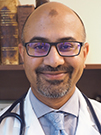By BETSY TAYLOR
Two of the nation's largest health systems, Catholic Health Initiatives and Dignity Health, have created an alliance to spread the use of precision medicine in the health care systems. The Precision Medicine Alliance, a 50-50 joint venture between the two systems, was announced on Sept. 19.
Precision medicine is an emerging approach for disease treatment and prevention that takes into account unique characteristics of individuals including variability in genes, the collection of microorganisms in the body, metabolism, health history, lifestyle and diet.

Kurbegov
Precision medicine is not currently in use for most diseases, according to the National Institutes of Health. Englewood, Colo.-based Catholic Health Initiatives and San Francisco-based Dignity Health want their new collaboration to speed the use of effective precision medicine throughout their two systems and believe their work will help to inform the use of precision medicine in health care more broadly, said leaders involved in the alliance.
"Our combined scale establishes this as the largest precision medicine-focused community health system collaboration in the nation," said Dr. Dax Kurbegov, CHI's physician vice president for the national oncology service line. "While precision medicine has traditionally been considered something only available in large academic centers, the Precision Medicine Alliance focuses on bringing the most advanced care to the 85 percent of patients who will never have access to such centers," he said.

Dean
Tailored to fit
Lloyd Dean, president and chief executive of Dignity Health, said the Precision Medicine Alliance will give community physicians access to a range of diagnostic technology. "This will provide more accurate diagnoses, with personalized therapies tailored to each patient through community providers, where the vast majority of care happens," Dean said in a statement.
Kevin Lofton, chief executive of Catholic Health Initiatives, said, "Conventional wisdom suggests patients suffering from the same condition should be treated with the same therapy. Science now tells us that the efficacy of one-size-fits-all for medications and therapies varies by patient because each person has a unique DNA profile that responds differently to prevailing treatments." The Precision Medicine Alliance, using genomics for diagnosis and treatments, enables a new degree of precision for identifying the most effective treatment and/or clinical trial for each patient, as well as those treatments that would potentially be ineffective or harmful, he said in a statement.

Lofton
Infrastructure
The alliance's administrative director Damon Hostin, a CHI executive for about six years before beginning his new role with the joint venture, has a background in both genetics and in business development. He said the alliance creates "a common group to serve both systems to help speed the usage of precision medicine techniques, the integration of data and cooperation on research in a way that is sustainable for health care." He said the alliance is a nonprofit that will adhere to the Ethical and Religious Directives for Catholic Health Care Services.
The alliance will have a four-member board, with two members from each system's clinical and strategic leadership; an advisory board of about eight clinicians; and additional advisors in fields like pharmacy and insurance, Hostin said. The alliance also will include some employees from each system, he said. The systems did not disclose the amount of their investments in the joint venture, though Hostin said both systems made a multiyear financial commitment to the alliance.

Hostin
Targeting cancer first
Initially, the alliance will focus on advanced diagnostic tumor profiling in cancer treatment to identify if a patient might benefit from a targeted therapy.
The NIH's National Cancer Institute, the federal government's principal agency for cancer research and training, calls "targeted therapies" the foundation of precision medicine. These treatments target the changes in cancer cells that help them grow, divide and spread. The institute says most targeted therapies are either small-molecule drugs used for targets inside cells or monoclonal antibody drugs that attach to specific targets on the outer surface of cancer cells.
Dr. Shahzad Siddique, an oncologist with Mercy Medical Group in Sacramento, Calif., and chair of the clinical council of oncology for Dignity Health, will be part of the advisory group for the alliance. He said much of the precision medicine in use today is happening at academic medical centers, where complex and expensive genetic tests can be done, often as part of clinical trials of new treatments. The alliance will work to bridge that research with the needs of community hospitals and outpatient treatment centers, to more quickly disseminate promising therapies. The work will give patients access to "better therapies that are less toxic and more effective," he said.
The alliance will distill and share research and information about proven precision medicine therapies with care providers, pharmacists and payers to expand the use of effective treatments.

Siddique
Kurbegov explained, "The science underlying new diagnostic tests and targeted agents is evolving so rapidly," it's beyond the ability of one person to keep up with the literature.
The health systems' resources can complement the alliance's work. For instance at CHI, he said, nurse navigators will guide precision medicine patients, clinical research will identify treatment options based on a patient's molecular and genetic profile and specialty pharmacies will address the needs of patients with complex medical issues.
The specialty pharmacies have expertise in acquiring and dispensing targeted therapies. They have staff who communicate with the patient's oncology team and educate patients about potential side effects of the therapies. They follow up with patients when therapies are administered, Kurbegov said.
Precision testing
The alliance will partner with laboratories and bioinformatics companies around the nation to develop precisely targeted tests to identify whether a patient is a good candidate for an established therapy or for a clinical trial of a particular cancer medicine. The thinking is that these tests would cost less than the complex genetic tests that gather more information than may be needed to make specific decisions related to an individual patient, Hostin said.
The alliance also is working on information technology and software improvements to pull data from a patient's electronic medical record into a format that will show care providers a patient's opportunities related to precision medicine. CHI, for instance, said it is working with Syapse, a precision medicine software company, on a format that will identify patients who might benefit from precision medicine, facilitate the ordering of appropriate tests and return test results in an actionable format.
The alliance also will gather data to evaluate the effectiveness of precision medicine therapies within its patient population and the costs of this care, both to patients and the health system.
Hostin said the alliance's work eventually will expand to include precision medicine related to cardiovascular disease and to pharmacogenomics, which is the study of how genes affect a person's response to drugs.
| Nation works to advance use of effective precision medicine The Precision Medicine Alliance says it will collect the same type of data that is being gathered through the national Precision Medicine Initiative, a $215 million government investment to accelerate biomedical research and therapies and provide clinicians with new tools to determine the optimal therapy for individual patients. Catholic Health Initiatives of Englewood, Colo., which is partnering with San Francisco-based Dignity Health to create the private Precision Medicine Alliance, has said in recent months that it is working to share de-identified patient data with researchers across the cancer community, as part of national work to prevent, treat and cure cancer. President Barack Obama announced the Precision Medicine Initiative in his 2015 State of the Union address. He called for advances in policy, research and technology to move toward more individualized care. About $130 million of that money was allocated to the National Institutes of Health in fiscal year 2016 to create a large research participant group. Roughly $70 million was allocated to the National Cancer Institute to better understand cancer genomics and the potential of personalized medicine in cancer treatment. Dr. Shahzad Siddique, a Mercy Medical Group oncologist in Sacramento, Calif., and chair of the clinical council of oncology for Dignity Health, said the national effort includes the creation of a voluntary research cohort of 1 million or more to advance understanding of disease and efforts to stimulate more clinical research, including grants for precision medicine research related to cancer care. — BETSY TAYLOR |
Copyright © 2016 by the Catholic Health Association
of the United States
For reprint permission, contact Betty Crosby or call (314) 253-3477.